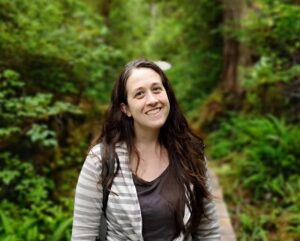Educational Signature Series:
Understanding Guilt with
Suicide Loss
Presented by Rebecca Sanford, PhD, RCSW, RCC
Program for Professionals:
Guilt and Suicide Grief: Supporting Grieving Clients
Date: Tues February 24, 2026 Time: 8-10am (PT)/ 9-11am (MT)/ 10-12pm (CT)/ 11-1pm (ET) location: Zoom
A special presentation for Hospice Professionals, Clergy, Law Enforcement, First Responders, Victim’s Advocates, Therapists/Counselors, Volunteers, Companions, Death Doulas, Death Care Professionals, including Administrative and Leadership Professionals in these settings who wish to become better equipped for discussing suicide-related topics.
After a suicide death, people left behind commonly question what they did or didn’t do, what was said or left unsaid, and what they might have missed. In retracing the steps and trying to make sense of what has happened, many people who have lost someone to suicide experience feelings of responsibility and guilt. Guilt can contribute to self-loathing and self-punishment, which makes a difficult journey even more painful. Further, guilt often becomes a catchall for any negative feelings one has about themselves as it relates to the loss, which can complicate the therapeutic process of healing after traumatic loss.
While research indicates that guilt is connected to negative outcomes in bereavement, there are few recorded interventions to support professionals in addressing bereavement related guilt in practice. This presentation aims to provide professionals with information and resources for supporting clients experiencing guilt after losing someone to suicide.
In this presentation, we will explore:
- What guilt is and is not
- Common sources of guilt in suicide bereavement
- The impact of guilt on the grief process
- Resources, interventions, and strategies for supporting grievers in developing an expanded understanding of and relationship to the guilt
Cost: $15. Registration Required.
Certificate of Completion provided upon request to professionals who attend live.
Program for the Community:
Exploring Guilt in Suicide Bereavement
Date: Tues. February 24, 2026 Time: 4-5:30 pm (PT)/ 5-6:30 pm (MT)/ 6-7:30 pm (CT)/ 7-8:30 pm (ET) location: Zoom
This gathering is for bereaved individuals or those supporting bereaved individuals who have been impacted by suicide loss.
After a suicide death, people left behind commonly question what they did or didn’t do, what was said or left unsaid, and what they might have missed. In retracing the steps and trying to make sense of what has happened, many people who have lost someone to suicide experience feelings of responsibility and guilt. And sometimes guilt can become a catchall word for any negative feelings one has about themselves as it relates to the loss.
This presentation is intended to support people who have lost someone to suicide and are experiencing guilt related to the loss. The presentation offers an opportunity to expand your understanding of guilt and reconsider your relationship to it.
In this presentation, we will explore:
- What guilt is and is not
- Thoughts and feelings involved in guilt
- Common sources of guilt in suicide bereavement
- The impact of guilt on the grief process
- Questions, prompts, and activities to support exploration of guilt in the service of healing
Cost: $15. Registration Required.
About the Presenter:

Rebecca L. Sanford, PhD, RCSW, RCC is an Associate Professor in the School of Social Work and Human Service at Thompson Rivers University in Kamloops, British Columbia, where she also maintains a counselling practice specializing in working with people who are impacted by suicide as well as people who work in the helping professions. Rebecca provides individual and group interventions for traumatic bereavement, and she is involved in community outreach efforts to promote awareness of suicide and to support people impacted by suicide. She conducts research to further our understanding of the impact of exposure to suicide, the suicide bereavement trajectory, interventions for people who are bereaved or otherwise impacted by suicide, and training for helping professionals on responding to suicide.
